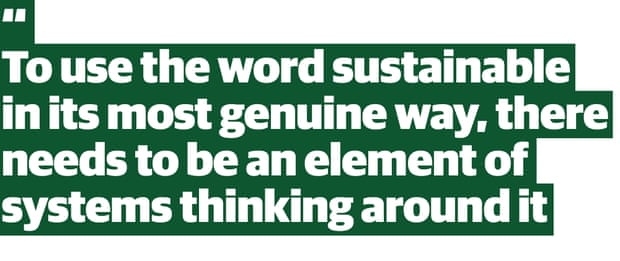
No doubt you will have heard the word “sustainable” recently. Or perhaps you hear it so often that you now just filter it out. Indeed, you may well feel the same about words such as “eco”, “ethical” and “social responsibility”.
This points to a problem that all businesses face. On the one hand, sustainability is increasingly important. But on the other hand, many organisations overuse the term to the point where it is now meaningless. It has become a label to slap on.
“It’s applied to literally anything and everything,” says Julia Fawsley Grant of ESGmark, an organisation that promotes and recognises environmental, social and governance (ESG) standards in business. Often, she says, “sustainable” just means slightly better – but “that doesn’t make it de facto sustainable. There’s now a complete conflation between a sustainable product, which is genuinely sustainable, and a product that is more sustainable than its worse alternative.”
All too often, easy words are not matched by difficult action. “There is definitely a challenge here that affects the whole business world,” says James Alexander, CEO of the UK Sustainable Investment and Finance Association. He notes that loose language and the ambiguity of the words businesses use can end up harming everyone, especially those who are genuinely committed to positive change, as it means they are often indistinguishable from those who merely talk a good game. Likewise, it can also make it harder for businesses to figure out how to genuinely improve their sustainability.

Arguably then, businesses need to rethink what they really mean when they talk about sustainability. One effective approach is to reframe it as viewing the whole picture: the full impact of your business on the world, and the impact of the world on your business – both in financial and non-financial terms. These might include the full extent of your carbon emissions, both from your own operations and also those of your suppliers and customers.
Viewing the whole picture also means recognising the full extent of the risks you face. These could include the physical risks to your business from the climate crisis, the regulatory risks of stricter emissions standards, the reputational risks of being found wanting, and any short-term economic risks you might face as a result of the global transition to clean energy. If you view the whole picture, you will have a much better handle on such factors. However, this raises another question: how do you gain that kind of visibility across your entire business and supply chain?

“If you’re going to use the word sustainable in its most genuine, functional way, there needs to be an element of systems thinking around it,” says Fawsley Grant.
Much of this is a data problem. Research by SAP suggests that 79% of companies are dissatisfied with the quality of data at their disposal to drive sustainability transformation. Thus, being a sustainable business is also about being a smart, data-driven business.
This also points to the opportunities businesses can seize as they view the whole picture. For instance, when you audit your entire supply chain, you may spot savings and efficiencies when it comes to energy use and the consumption of natural resources. It is also a potential opportunity for SMEs because, by being demonstrably more sustainable, they are more likely to be used by bigger companies that audit the sustainability of their own supply chains.
The same goes for attracting investment. According to the Edelman Trust Barometer, 88% of institutional investors agree (pdf) with subjecting ESG factors to the same scrutiny as financial considerations – which means that genuinely sustainable businesses might also be able to secure better access to funding.
Seeing the whole picture also means having a better long-term view. A company that relies on renewable energy or pays a decent wage will be avoiding future costs, whether it’s cleaning up its emissions or complying with future legislation. Indeed, many sustainable companies tend to welcome legislation, as it offers clarity and levels the playing field. They are also likely to be more resilient and better placed to weather shocks. This can even extend to recruitment, given the increasing importance of sustainability credentials to potential hires.
Viewing the whole picture is thus both the right thing to do and a long-term competitive advantage.
Find out more at sap.com/uk/sustainability